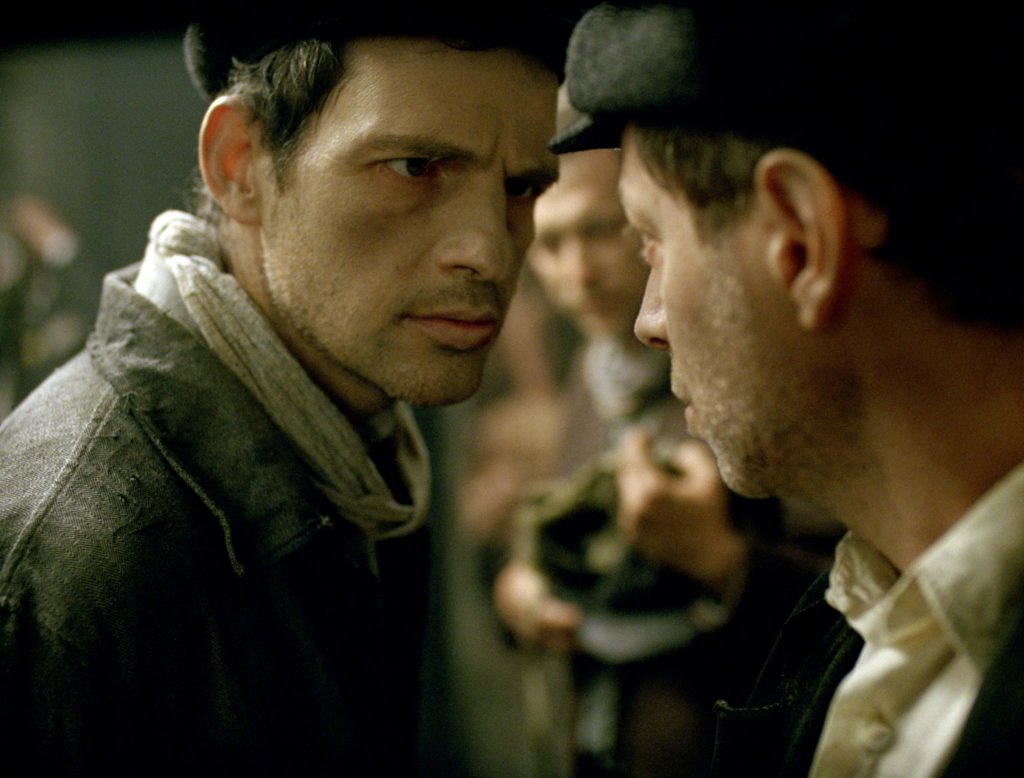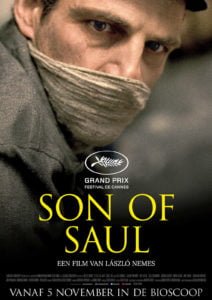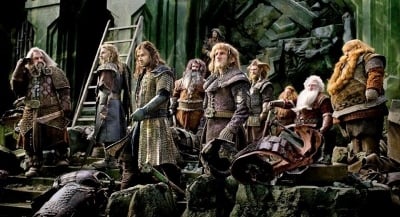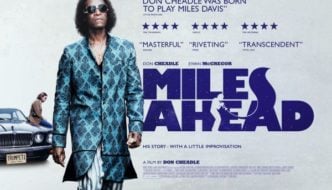Review: Son of Saul by László Nemes
May 4, 2016

For a director to choose the Holocaust as the subject matter for his debut feature is an act of audacity bordering on the hubristic. The subject has eluded the best of them – Stanley Kubrick spent over twenty years developing his Holocaust drama, The Aryan Papers, before the scale of the horror overwhelmed him and he abandoned the project. 39-year-old László Nemes has certainly done sterling work in positioning Son of Saul beyond the parameters of how the Holocaust has previously been depicted dramatically – be it Sophie’s Choice (1982), The Pawnbroker (1964), The Pianist (2002) or Schindler’s List (1993). Son of Saul seeks to shift the emotional tenor of the Holocaust drama from one of exceptional heroism and survival to what Nemes describes as ‘the human experience of the camp’, a world of ‘limitations, lack of knowledge and frenzy’ where there is ‘no safe road’ to redemption.
Son of Saul is inspired by the book Voices from Beneath the Ashes; a collection of testimonials from members of the Sonderkommando, a special unit composed of camp inmates which was separated from the rest of the camp and worked for a few months assisting in the extermination process before being executed. The Sonderkommandos buried their testimonials in the grounds of the death camps, which were unearthed when the camps were liberated. Saul Ausländer (Géza Röhrig) is one such Sonderkommando member: he shepherds prisoners from the trains, sorts through their clothes for valuables, cleans the gas chambers and disposes of the corpses. A young boy briefly survives the gas chamber before expiring, and Saul is convinced that the boy is his son. Saul prevents doctors from performing an autopsy on the boy and fights to give the boy’s body an honourable burial.
 The awards heaped on Son of Saul almost serve to obfuscate its potency. Nemes has stripped away the accretion of historical perspective to tell a story which discards the classical model in favour of documentary immediacy, hitting a pitch of transcendent naturalism. Along with co-writer Clara Royer, Nemes has fashioned a story which resides in what Primo Levi called ‘the grey zone’, sharing more in common philosophically with Claude Lanzmann’s documentary Shoah (1985) – Lanzmann has described Son of Saul as ‘the anti-Schindler’s List‘ – and God on Trial (2008). As observers – we are not viewers here – we share in Saul’s dazed disbelief at the hideous mechanics of the death machine within which he is trapped. Son of Saul has much to say about the complicity in suffering that stains us all.
The awards heaped on Son of Saul almost serve to obfuscate its potency. Nemes has stripped away the accretion of historical perspective to tell a story which discards the classical model in favour of documentary immediacy, hitting a pitch of transcendent naturalism. Along with co-writer Clara Royer, Nemes has fashioned a story which resides in what Primo Levi called ‘the grey zone’, sharing more in common philosophically with Claude Lanzmann’s documentary Shoah (1985) – Lanzmann has described Son of Saul as ‘the anti-Schindler’s List‘ – and God on Trial (2008). As observers – we are not viewers here – we share in Saul’s dazed disbelief at the hideous mechanics of the death machine within which he is trapped. Son of Saul has much to say about the complicity in suffering that stains us all.
Nemes’s stylistic choices are calculated to create a palpable sense of foreboding and unease. Forced perspective is used throughout: we see only what Saul can see or hear. By narrowing the scope of the tragedy, we become attuned to its human scale, putting a single man at the centre of this purgatory. Cinematographer Mátyás Erdély plays with focus to striking effect, creating a subjectivity of vision which blurs the casual barbarity occurring around Saul, and lends it a fresh horror by being obscured. Son of Saul is also shot on 35mm, which is evident in the relationship of light and shade that only celluloid can capture. Sound is another crucial component: anguished cries and barked orders waft into earshot, offering a sense of the world occurring beyond the frame, whose 1.375:1 square ‘academy’ aspect ratio underscores the sense of confinement, and intensifies the close-ups which consume the screen.
At 48, this is Röhrig’s first film role. A poet and former punk musician, Röhrig is an immense discovery, delivering an outstanding physical performance which one can pay the highest compliment of being totally un-actorly. His face a map of suffering, Röhrig cuts a wraith-like figure as a man who has been reduced to his basest elements, operating under the extreme circumspection of survival, bearing the weight of his duty yet spurred by the sight of the boy’s body to rectify this cosmic imbalance. As bleak as Son of Saul is, a residue of humanity persists in Saul’s struggle, and the suggestion of something more profound at work. Dramatists keep returning to this story because it is one that needs to be retold. The story needs to be retold in as many forms as possible because it is a lesson that must be relearned. It is a story that transcends historical and geographical concerns. With the far-right resurgent throughout Europe, Son of Saul is vital filmmaking in every sense of the word.
Follow Daniel Palmer on Twitter at @mrdmpalmer.




Comments